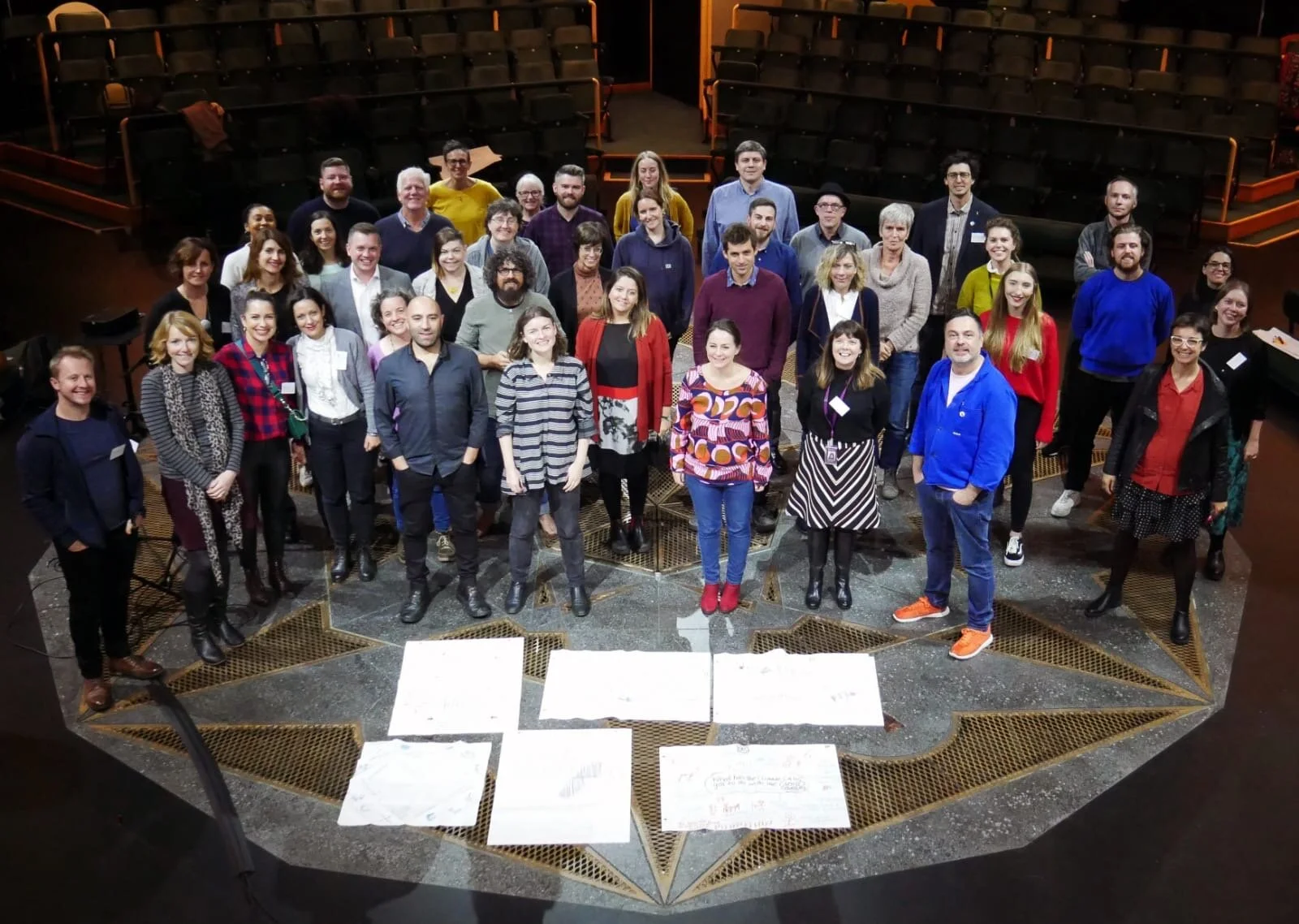
Network Initiatives
We provide a platform for organisations to share and exchange good practice and ideas and we also undertake joint initiatives to scale up our impact and strengthen and use our collective voice.
Along the way we have been supported by a range of different organisations, such as Julie’s Bicycle, the Carbon Literacy Project, the Green Growth Hub and the Manchester Climate Change Agency.
Capacity-building
Building the skills, capacity and confidence to take informed action is crucial. Carbon Literacy training has been central to this for MAST.
A key moment was in 2016, when we collaborated with Manchester Metropolitan University and the Carbon Literacy Project, to develop carbon literacy training which would speak to the arts and culture sector.
Carbon Literacy training at HOME, Image: Philip Kennedy
Today, most of our participating organisations provide carbon literacy training for at least some team members, and some, such as HOME, ITV and Walk the Plank, ensure all staff have training.
In 2020, thanks to C-Change, we developed online carbon literacy training, delivered to 100 people in early 2021, as well as a new e-learning tool. Through C-Change, we also brought our sector training approach to five European cities. By the end of 2020, 160 people across the C-Change cities had done sector-led climate change awareness-raising sessions and 12 new trainers were in place.
Over the last two years, we have started to do more on capacity-building for leadership, notably through 2020’s Brave New World event for the city’s Cultural Leaders Group with Manchester Museum and 2021’s Manchester Creative Climate Roundtables with Julie’s Bicycle.

“All our team participated in the carbon literacy course. This acted as a catalyst for change within our organisation and on a personal level. Working with MAST and our team, we are now on our environmental journey of reducing our carbon footprint. By working collectively, we have also gained knowledge and a better understanding of what is happening locally and globally around the impact of climate change and how we can contribute to make change.”
Karen Shannon, CEO, Manchester Histories
Climate Change Partnership
MAST began because the Manchester Cultural Partnership wanted to explore how the arts and culture could contribute to the city’s first climate change strategy Manchester: A Certain Future (MACF) 2010-2020.
In its first few years, we worked, with Julie’s Bicycle support, to understand our collective impact and members took action to reduce emissions in line with MACF’s 41% reduction target.
In 2015, we joined the MACF steering group, contributing to strategy development, under the lead of the newly established Manchester Climate Change Agency, a move to a more devolved partnership-based model.
In 2018 the steering group was replaced by the Manchester Climate Change Partnership (MCCP). This provided new connections in the city and across sectors who had not previously come together on climate as well as a youth board. Today, we are one of the most established MCCP partners contributing to strategy development and implementation and sharing our model with others in the partnership.

“Our partnership with the city's arts and culture sector is central to our strategy; working together to develop creative new ways to get people on board …ensuring we reach every corner of the city's diverse communities, working in ways that are exciting and meaningful to our citizens, especially in those places that stand to benefit most from ambitious climate action.”
Jonny Sadler, Manchester Climate Change Agency
Inspiring others
As our approach gained recognition, in the UK and beyond, we began to share our model and experience with arts and cultural organisations in other cities interested in doing something similar.
SAIL - Sustainable Arts in Leeds, founded by ITV and Opera North, started in 2018. SHIFT, founded by Metal, is a newer sustainability network for cultural organisations in the Liverpool City Region.
In 2017, Manchester received the Urbact Good Practice City Award as a result of our place-based and policy-linked cultural collaboration on climate.
This was the beginning of a new chapter in the MAST story, as it led to creation the Urbact transfer network we were to call C-Change: Arts and Culture Leading Climate Action in Cities.
Over three years, we shared our approach and insights with five European cities, helping them to do something similar. The whole process, facilitated by Julie’s Bicycle and managed by Manchester City Council (MCC), helped us better understand and define our model and work out how we could develop it further. It also helped reconnect MAST, the Council and the city’s cultural leaders and has led to a number of new and exciting collaborative measures.

“The MAST model was a huge inspiration for us setting up Sustainable Arts in Leeds (SAIL). In fact, our name is an homage to the MAST network! We saw the impact of having arts and cultural organisations working together to collectively lower their carbon footprints, learn from each other and use their voice to lobby for change at a local authority level which really helped to show us what was possible here over the Pennines.”
Jamie Saye, Co-founder of SAIL and Senior Technician at Opera North
C-Change pilot actions
When C-Change started in 2018, we had already many great examples of cultural and creative organisations engaging with people in the city on climate and environment.
However, with the exception of Climate Lab - an experimental programme run by Manchester Climate Change Agency to test different ways of engaging people in city climate change strategy - these initiatives were not really joined up. C-Change gave us an opportunity to change that.
Walk the Plank’s Mythbuster at Cathedral Gardens, summer 2021
With about £10,000 - half from Urbact and half from MAST - Manchester City Council ran a pilot action programme supporting six creative responses to starting a climate conversation with people in the city:
Brighter Sound and Reform Radio’s Playing for Time commissions gave two young artists a platform to express their feelings about climate change and to inspire others through the power of music, while providing the artists with professional mentoring and recording experience
Centre for Chinese Contemporary Art’s YouthLab: Green Shoots, a collaborative and experimental programme with six young creatives exploring what green shoots can emerge out of the Covid crisis and what this means for the future of Manchester
Ergon Theatre’s The Wicked Problem, an interactive performance on climate justice and equity, a Re:Con ‘Bee The Change’ commission, also part of Season for Change
The People’s History Museum’s Radical Late: Think Globally, Act Locally: Space to Imagine, Time to Act – an evening of talks, discussions and workshops, inspired by objects at the museum, exploring the power of collective action in tackling the climate crisis and climate grief, in partnership with Atherton Youth Voice and Wigan Youth Cabinet
Walk the Plank’s Mythbuster, an interactive installation to engage the public and debunk myths about the climate emergency and designed for use as a pop-up at outdoor events
The pilot actions have not only been a brilliant way in which to explore what people respond to but also another step bringing city and sector, culture and climate closer together.





